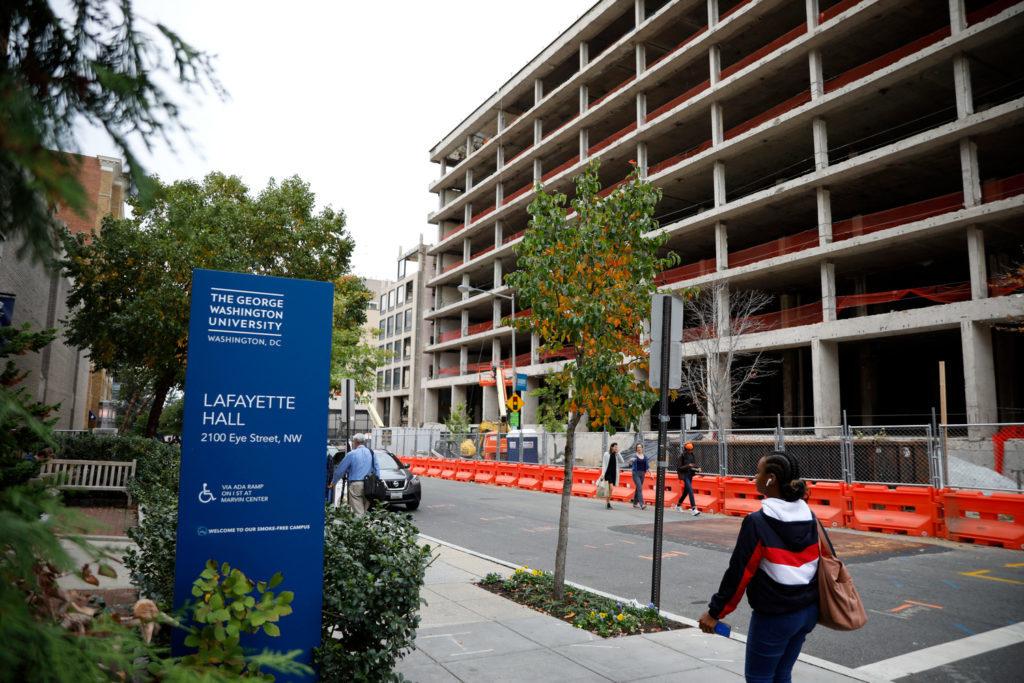Updated: Oct. 29, 2019 at 7:33 p.m.
Lafayette Hall residents have lacked a good night’s sleep this semester as nearby construction progresses.
Officials announced plans to demolish 2100 Pennsylvania Ave. in April as part of a partnership with real estate company Boston Properties to redevelop the building into commercial spaces in 2022. University spokeswoman Crystal Nosal said D.C. Water’s pipe inspection under the roads near the demolition project caused increased night noise last week.
She said officials did not notify students about the added construction noise because D.C. Water didn’t give officials advance notice of the company’s extra work. Similar work in the past did not raise noise complaints, Nosal said.
“Given the concerns shared by students, the University will ensure notice is shared of any future night-time work associated with this project and the University thanks those students impacted for their patience,” she said in an email.
Nosal said officials are working with resident advisers and Residence Hall Association members in Lafayette Hall to communicate students’ concerns to Boston Properties. Officials are providing students with free ear plugs and white noise machines to help students block out the commotion outside the residence hall, she said.
More than 15 students who live in Lafayette Hall said they’ve heard construction noise as early as 7 a.m. throughout the semester and 3 a.m. last week, which has kept them from getting adequate sleep.
Margot Thompson, a freshman who lives on the fifth floor, said she has heard noise from 2100 Penn construction in the middle of the night for about a month.
“I’ll hear jackhammering right outside my window, at 2 or 3 in the morning, and there’s nothing I can do about it except for call the police, but they haven’t really done anything,” she said.
Thompson said she and her roommate have tried using earplugs to block the noise, but they still hear the construction because the site sits about 50 feet from their room. She said she plans to gather “testimonials” from students affected by the noise and file a formal complaint with housing officials.
“GW should give the residents of Lafayette some kind of compensation, because we’re paying $16,000 to live here and we can’t even sleep at night,” she said.
Maria Paz Recalde, a sixth-floor resident, said the construction noise last week prevented her from studying for the next day’s classes late at night.
“We can’t study at night,” she said. “We used to be able to read at least for the lectures we have the next day, but now I can’t do that because I cannot concentrate that much.”
Natalie Chevrel, a freshman living on the sixth floor, said she heard construction noise starting as late as 2 a.m. throughout last week. She said housing officials organized a gathering at which they handed out cookies for the residents in response to the loud construction, but the event didn’t address the continued noise.
“Obviously, they need to do that work,” Chevrel said. “I would prefer for it to be during the day because we could go to Gelman. We can go to another building to study, but at night we need our sleep.”
Kathryn Burkley, an eighth-floor resident, said she wears headphones to block out the construction noise when construction employees are working. Burkley said she heard noise last week as early as 3 a.m., but construction noise usually begins between 7 and 9 a.m.
“It would’ve been far more problematic if I couldn’t go to sleep and I had a midterm the next morning,” Burkley said.
James Harnett, a senior who lives in Lafayette and a Foggy Bottom and West End Advisory Neighborhood Commissioner, said the construction workers have been operating within their permit from 7 a.m. to 7 p.m., but last week, D.C. Water was jackhammering in the street outside of the residence hall at about 2 a.m. He said D.C. Water obtained a permit from the District Department of Transportation to conduct the work without soliciting feedback from community members.
Harnett said the Department of Consumer and Regulatory Affairs requires that DDOT receive community input about a construction project before granting a construction company a permit but does not require community feedback for road work.
He said he will ask to hold a vote at the ANC’s November meeting to require that DDOT solicit community feedback before issuing permits for construction work on roads.
“Especially given that it’s midterms week for a lot of people, and we have very limited opportunities to get a full night’s sleep as it is, as college students it’s really unacceptable that we didn’t have any oversight as part of this process,” he said.
Andara Katong contributed reporting.





